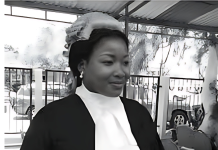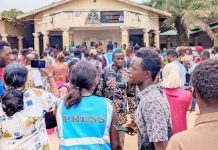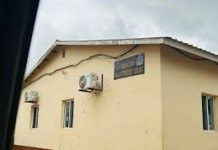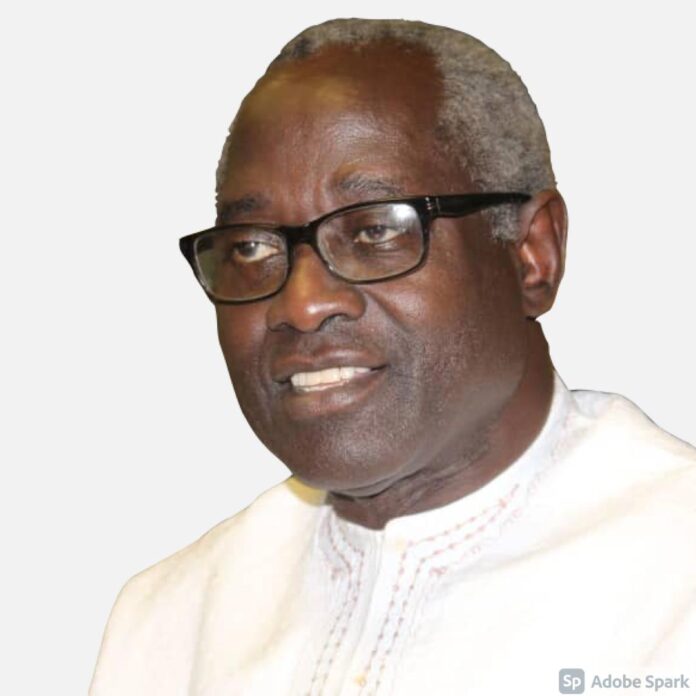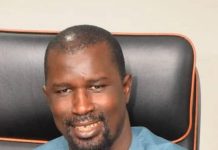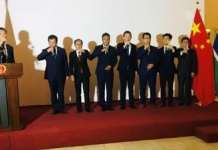Transcribed by Yankuba Jallow
On Wednesday, 16 July 2025, the People’s Democratic Organisation for Independence and Socialism (PDOIS) held a press conference at its headquarters in Churchill Town to address what it described as the country’s deepening constitutional impasse. The Secretary General of the party, Halifa Sallah, led the address, calling for an urgent national conversation on the way forward after failed attempts to promulgate a new constitution for the Third Republic. Below is the full verbatim transcript of the remarks by Honourable Sidia Jatta and Secretary General Halifa Sallah:
Honourable Sidia Jatta (Chairman):
“Good afternoon, everybody, and welcome to the PDOIS Press Conference. This one is special in the sense that it is about the problem that everybody is talking about, the constitutional impasse, and what is the way forward. That is the theme of the conference, and we have the Secretary General, Halifa, to deliver on this particular theme. Thank you very much.”
Halifa Sallah (Secretary-General):
We thank the media for being present in large numbers because of the importance of this conversation. We are here gathered to talk about what makes us who we are, why we call ourselves Gambians, why we have a nation called the Gambia. Nothing is more important than what we are here to talk about. That is the constitution of the republic.
We all heard that the process that was on to build or make a constitution has been aborted. Many are asking why, many are asking what the way forward is. This is what led us to convene this press conference to address the burning issues of our day. Constitutions have nature and characteristics based on the type of system that exists.
We have developed as a nation to become a republic. That is why a constitution is so important in our existence, that each of us from nursery school should have been prepared to know what a constitution actually is. The building of a constitution has fundamental principles. You elect National Assembly members to be your lawmakers and no nation can be a civilised nation without laws for all of us to observe in common. That is why we talk about the rule of law. All of us under the law, equal under the law, non-superior to the other.
That is why we elect those we deem fit to go into the National assembly to make the laws that we would have made for ourselves. And section 100 of the constitution says that the legislative power, law making power of the land is introduced in the form of bills that must be passed by the National Assembly, assented to by the President for a law to be made. These are very important offices in our country.
And that is why, even in the standing orders of parliament, it is emphasised that you have three types of bills that are based on the requirements of the constitution. Section 100 of the constitution affirms that the members of cabinet and the National Assembly members are the ones who are empowered to introduce bills in the National Assembly. Pass it and then it goes to the President for assent.
But the constitution sees certain bills to be so fundamental to our existence that it does not believe that it should be transformed into law by the simple mechanism of passing it in the National Assembly and then sending it to the president for an assent. The constitution emphasises that all the entrench clauses will require to be brought to you at a referendum for you to decide whether those entrench clauses could be touched. And that is why each of us must see himself-herself as a law maker.
This discourse should be of interest to you. Why are we here today?
We have a 1997 constitution. In 2016, a change of government occurred. And those who collaborated to form a coalition to change the government emphasised the need to look at the 1997 constitution again in order to examine all the defects and then provide remedies to those defects. That was their commitment, their promise, our promise. The promise of a coalition. The promise of a people. To look at its instrument and improve it. A CRC (Constitutional Review Commission) was established to conduct consultation with the people and prepare a draft which will be forwarded to the president and their mission would have been accomplished. But that is not the end of the journey. For that draft to ultimately become the constitution of the Third Republic it had to go through parliamentary procedure. Parliamentary jurisprudence had to be exercised for that draft to change from being a draft and become a constitution.
And the requirement of the constitution under section 226 is that that draft would have to be transformed into a bill that would be published for three months for your notice and then for no less than ten days a second publication for your notice so that the whole Gambian nation will know that what was a draft is now a bill that must go through the process to become the constitution of the Republic. Eventually that bill came before the National Assembly at its second reading because of the constitutional requirement that three quarters of the membership of the National Assembly must pass it to go to a next stage. That did not happen. It was thrown out.
Presidents, diplomats, intellectuals, many people intervened to see how Gambia could come up with a constitution for a Third Republic. But ultimately, the executive, by its own volition without much consultation with those who hold political office decided to bring another bill to the National Assembly to start the promulgation process of the constitution of a Third Republic. That also went to the second reading and could not get the three quarter majority and was also thrown out.
We the Gambian people are now to ask ourselves the fundamental question. What do we do next? Are we to allow ourselves to be held hostage by those we have given authority to serve us or do we need to open up a national conversation and involve them in that conversation so that we find a way out for ourselves and our country.
This press conference is convened to motivate the Gambian people to begin that conversation, that national conversation for a way forward, for a better constitution for a Third Republic. Still both are possible but we have to make fundamental decisions to make either one possible but one must be possible otherwise we are doomed. Where do we start?
We start by explaining what a constitution making process is and what a bill, a constitutional promulgation bill is.
There are many misconceptions. The 2020 draft which became a bill is not meant to be a perfect document. The 2024 draft which became a bill is not a perfect document.
These bills are brought to the National Assembly for scrutiny. They are not brought for adoption. Those who drafted the bills are not lawmakers. They have knowledge of law drafting but they are not lawmakers. Let me give you an example to show the imperfection of these bills that were brought to the National Assembly for scrutiny. We all know how important women are. They constitute more than half the population. Now if you want to look at the 1997 constitution and transform it into an APRC document that I love the former president, if he brought a document then I should not touch it. If that is your mindset and you are a woman, then section 28 is just simply telling you men and women must be equal in dignity and we must provide opportunities for women to have participation in economic, political, social life. You go to section 214, it’s a directive principle of state policy in the composition of the cabinet. Women must be fairly represented. But what is fairly represented? Section 215, economically, they must be given equal opportunities. These are principles but since 1997, how many women found themselves in the National Assembly, in cabinet, enjoying equal opportunities? It did not exist. And women’s movements have been shouting that women have not been properly represented. In fact, they have been shortchanged. But that is the language of the 1997 constitution. There is no quota anywhere that says that women will have 30% of representation in all the representative institutes. It does not say so. So how can any woman take ownership of that as your document? It is inadequate. It stated principles but gave you no authority to participate as equals. So that law is inadequate.
Here comes the 2020 draft. It aims to address that. You go to the schedule that is established for that and what they said is that you will have elections for 14 positions in the National Assembly. 53 seats. 14 will now be allocated to women so that elections will take place for those 14 seats, two per region. And then two people who will be representing the disabled. But it did not even say what the gender characteristics of those two people should be. It’s just two people. It means you can even select two males.
So you see, that type of representation is what the 2020 draft aims to give. But then there is a law under the Women’s Act which was promulgated to improve the Women’s Act which says that in terms of political representation you should have 30% representation of women. So that 2020 draft that became a bill of the CRC is inadequate.
It has not reached that quota. And it has not properly represented disabled women. It did not say one man, one woman who are disabled. It said just two disabled persons. So that law is still inadequate. So if you embrace as a woman that that document should not be touched then you are yet to know what is in the document and you are yet to know what you are writing.That document was meant to be touched. That’s the thrust of my argument.
And now the 2024. Let’s say you are a woman supporter of the NPP. In the quota that they established in the schedule – what was 14 they reduced it to 7. And not only 7, instead of elections now the parties that won in the regions will be given the right to select a representation. How they are going to do that is still questionable.
Because the region comprises many consequences. So if this win, you won there so how will you ultimately determine them? Not only that. From election to five people being nominated. You go back to nomination. Who on earth, who is a woman regardless whether you are NPP or any party would accept that to be a document you should embrace? So what is the argument? The argument is that the 2020 draft had many shortcomings. The 2024 draft had many shortcomings. There were intentions provided by those who drafted it. And those intentions were converted into a bill. And the bill given to the National Assembly for scrutiny.
Therefore, in 2020 as well as in 2024, the duty of your lawmakers was to look at these bills, scrutinise them, tamper them so that they meet your satisfaction. How could they do that? What the law says is that the bill will go through the first reading to be introduced and second reading where Standing Order 66 says that the principles will be a subject of debate and voting. Because to make a law you have to explain why you are making it.
Law is made for a purpose, for an object. And that is why the Constitution says under Section 101 that before you introduce a law you must state those principles, the policies embodying it and the defects you intend to remedy the purpose for introducing it. There is a reason.
And the National Assembly members must question the reason behind the laws. And their voting will start from examining the reasons. And Standing Order 64 emphasises that when they look at all the reasons and the objects, the purpose then they can also under Standing Order 66 vote on the principles.
I hope I am being very clear. Law is made for a purpose. Either to prohibit something, to prevent something, to promote something, to protect something, to preserve something. Law is made for a purpose. It says your lawmakers must develop the knowledge and base of examining the purpose of a law before they even proceed to examine the content. So during the second reading, the debate should be about principles. And I have clearly shown you the inadequacies of the 1997 Constitution, the 2020 draft and the 2024 draft so those are the inadequacies that should have been examined and laid the foundation that there is need to interrogate the Constitution and improve its content.
Let me give you another example of inadequacy. Look at the diaspora. We talk about diaspora voting, diaspora voting, diaspora voting.
But if you look at the 1997 Constitution it says that every Gambian above 18 years old has the right to be registered as a voter and to vote. That is established by the Constitution. Something is said there to be registered under a constituency which if it becomes problematic you could have amended 20 something years ago.
But it did not pose any difficulty because the elections have become clear that Gambians abroad should be registered under section 11 of the Election Act and under section 141 that they should vote in presidential elections. Every Gambian who lives here and goes abroad came from somewhere. You originated somewhere. You originated from a constituency. What is the difficulty in registering that person under that constituency? What difficulty is there? If the will is there. That is why it’s just utter neglect.
That is the reason why Gambians in the diaspora could not vote. Now you want to amend that. And the 2020 draft is saying that the electoral law, the electoral law that should accompany the Constitution should progressively introduce the registration of Gambians abroad.
I hope Gambians abroad are listening to me very carefully. Go and look at your 2020 draft. The section that deals with representation that deals with electoral laws. It is saying to register you should be progressively done. You have a right. Why should that right be progressively given? And in the 2024 draft the same language is what is there. Who in the diaspora will take ownership of these two documents? They all need scrutiny and remedy. And that is why the National Assembly is the appropriate body to do that. And they are given all the powers to do it because they are the lawmakers.
Nobody can dictate to them. The 2020 draft was prepared by an independent body of competent Gambians. They did what they believed Gambians wanted.
And could afford to do. So now those who were elected were the ones who should have examined whether what they did was adequate. And add whatever was necessary to make it fit for purpose. The same thing with 2024. Prepared by the executive. But once they bring it to the National Assembly that is where it stops. They have no authority to impose on anybody so that it will pass to become a law. So if the executive fails to consult, it was now the opportunity of the National Assembly to show the executive that what they failed to do the National Assembly will do. That is where the National Assembly comes in. That is where the National Assembly should have enhanced its image and integrity and clout. How should that have happened? The second reading should have been the basis of criticising all that, the process of bringing the bill, the lack of consultation, anything could have been said at that time. Accuse the executive of whatever you wish, but then to show that let’s proceed to the important stage of doing our work for the Gambian people. And the constitution says that from the second reading, if they allow it to pass, they will go to the committee stage, and in that committee stage, this is where the scrutiny should have started. The whole Gambian nation would have been invited to send their opinions, just like I am analysing now. Of course, we would have analysed the whole constitution and sent it to them, as we did in 1997. It’s our duty. Thinkers would have done it. Political parties would have done it. Religious leaders would have done it. So scrutiny would have been exercised, and then they would have prepared a report on the opinions of all of us on the content of the constitution.
Then they, as National Assembly members, will go to the consideration stage, and clause by clause, they will scrutinise and vote, clause by clause, scrutinise and vote up to the end. Then they vote, a three-quarter majority, accept what is left. That is taken to the IEC to prepare for a referendum within six months.
Then the people will be consulted, and then the debate will still continue. And from that debate, we would have reached a national consensus. If Gambians are really Gambians, if the nation really belongs to us, if each of us is interested in having a constitution that is fit for purpose, then why should we be divided on its content? We should have been able to build consensus. And in fact, that is the process of nation-building. Constitution-making is a process of nation-building because you are building the mindset of a people on how they are supposed to be governed. Nothing is more important to a nation than the constitution-making process.
All of us should have spoken with one voice to allow each to scrutinise, criticise, and come up with suggestions, bold suggestions, so that ultimately we all agree that our future is secure under that fundamental law of the land, which will govern our existence. This did not happen in 2020. It has not happen in 2024.
We will be having other programmes, public lectures on constitutions and constitution-building, but this is meant for a specific purpose, to awaken all of us, to know that if we are not involved, we’ll be left behind. If we do not take charge of our destiny, we will be victims of blind destiny. It is now the people who should speak. That’s why we are addressing you. The lawmakers have spoken. It is now your time to speak.
If you do agree that the process was to move from the second reading to the committee stage so that the constitution will be scrutinised, it was not voting to adopt it as many had thought in 2020. I was among those, I was in the National Assembly, who supported that it should pass the second reading, but the objective of supporting it was not to adopt the constitution, it’s to bring it so that I could scrutinise it, and that was the duty of all the National Assembly members at that time, and still their duty, but this is what had happened. Where do we go from here? When you make a decision in the National Assembly, you cannot bring that back for consideration, just like that.
As it stands, the 2024 draft is dead. Is it possible to bring it back to life? Yes, before the end of this session of the National Assembly, because under Standing Order 29, paragraph three, when you make a decision, you cannot bring it back unless you rescind that decision, which means that they can introduce a motion to rescind their decision. All it requires, under the Standing Orders, is that whoever is going to introduce the motion will submit at the table, table office, your proposal of a motion to rescind the decision that they have taken, and if it is introduced within five clear days, they can consider the possibility of introducing that motion for a debate, and if the National Assembly members adopt it, they can revoke their decision, and then move back where they were to start the process.
That is possible, but if that is not done until the end of their session, then that is it. I don’t want to speculate whether their session is on or is not on. I’m telling you what the situation is.
If the session ends, then you go back to our situation where I tried to introduce a motion after the end of the session, hoping, as the Standing Order says, that the Speaker will allow that motion, but it was not allowed, so precedence has been set in that regard. Then the motion would not be introduced, and the 2024 bill is dead. Then what next? What next is what Section 226 (of the Constitution) was meant for.
Section 226 was not meant for wholesale transformation of a constitution. It had provision for amendment of a constitution. That is constitution building. What is required now, with immediacy, is the executives to engage in consultation, and we all look at the 1997 constitution and make bold recommendations for its amendment. The 1997 constitution does not have a term limit – you can be there for eternity, as long as the people concur.
You can use patronage to buy votes. You can do anything which is against the law, but just to sustain yourself in power. As long as the people are in a position to be bought. Then you can stay in power as long as you wish, relying on the politics of patronage.
Some can get frustrated and say, let’s take this street. People taking streets, and governments may or may not change, but then wherever streets were taken, one does not see the ultimate consequences of a public order controlled by a people whose aims and aspirations are being addressed. We don’t have to become hostages. We are supposed to be free. Governments are supposed to exist for us. We are not supposed to exist just to oil the machinery of government with taxation.
So, in essence, we can amend the constitution to introduce a term limit. There was a provision under section 48 of the constitution where if you don’t have 50% plus in an election, you have a second round. It was amended. It can even be restored by the current National Assembly without a referendum, because it’s not an entrenched clause. We need women representation, 30%. And the National Assembly members can all agree so that that can be part of the amendments, where you can even have women alone elections for that 30%. And women can stand for political parties or independent candidates, but it’s women participating to occupy 30% of the seats in the National Assembly. That can be to ensure that this time is not just a principle being asserted. It is a law being affirmed. Diaspora voting and registration. We can emphasise that it happens, come up with all the amendments that are necessary. Civil servants, under a decree in 1996, they could participate in election, be paid during the time of their participation until five days after the election.
If they lose, they go back to their jobs. In the 1997 constitution, they decided to restrict their participation by demanding one year leave without pay to participate. And in the 2020 (draft constitution) they reduce it to six months. That’s why I’m saying none of these documents is perfect. And this current one, reduce it for six months, and then you can see the ambiguity, mentioning that you could go back to your job. A law that has ambiguity is not a good law. So all this needed to be scrutinised. Now we can scrutinise all that and come up with a decision that will serve our purpose. So our emphasis is that as a people, whether we are part of NGOs, political parties, or the civil society organisations, religious groups, we should all fall back to our groups and engage in that discussion as to the type of amendments we need, and we formulate it, and then throw it into the public space for a debate.
So that ultimately I am convinced, whether it’s the UN, ECOWAS, AU, our partners will come to consult all of us. And if all of us agree that we have a bulk of amendments that we don’t want to compromise on, this, we insist, must become part of the 1997 Constitution, I am convinced that our voice or voices will be heard. On that note, I would like to say that PDOIS has been engaged in real conversation on the way forward for this nation, and we are convinced that what is missing is a national agenda.
We cannot transform the nation into a partisan agenda, because all of us own this nation together. So there is a need for a national agenda, then you can convert that into your partisan agenda. So the conversation should start now. A Constitution belongs to all of us. It is designed to govern all of us. So it is important to all of us.
Let us all work together then to make it fit for our purpose. Thank you. Thank you.








